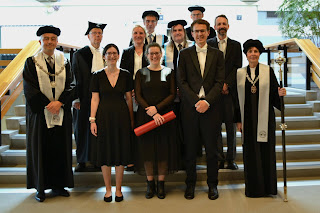This spring, we welcomed a new group member: Elisa van Merkesteijn. Elisa will be working in the DARSea project, where she will focus on the modelling of regional sea-level change in the past century. It's great to have her on board! In April we took part in the EGU25 general assembly in Vienna, where we co-convened the sea-level session: https://meetingorganizer.copernicus.org/EGU25/session/52385 . It was, as always, a very nice session to be part of, and we enjoyed all the great talks and posters in the session! We're looking forward to next year! A big milestone was the finishing of the PROTECT project, a H2020 project that we've been involved in from beginning to end, and which has been a great success. There is still work ongoing in writing up the final results, so it is not the real end, but the formal collaboration has ended which is bittersweet after such a long time of working together. Our overall messages and key output can be found by clicking on the image be...





